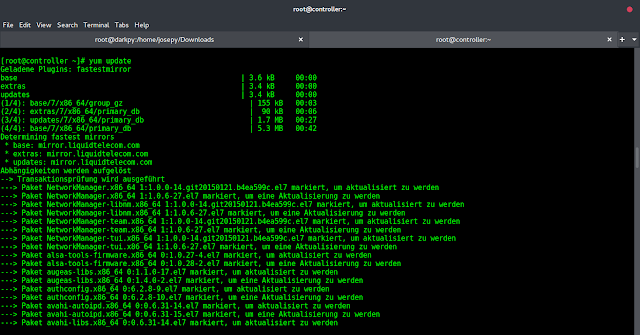Introduction
DevOps is a software development methodology that promotes automation across the entire software development life cycle (SDLC). Therefore, there are many DevOps tools that enable automation at various SDLC stages.
This article compares two popular automation solutions, Ansible and Jenkins.


What is Ansible?
Ansible is a collection of open-source Infrastructure as code (IaC) tools that automate configuration management, cloud provisioning, application deployment, and more.
DevOps engineers use Ansible’s IaC approach to provision and scale environment infrastructure elements, such as virtualized hypervisors, network devices, and bare metal servers.
Ansible Features
Ansible is designed to be flexible and extensible while remaining simple to use. Below is the list of the essential Ansible features:
- Agentless architecture. Ansible uses SSH to connect to client machines. Therefore, it does not require agent applications on servers.
- Declarative approach. Ansible Playbooks are special YAML files that describe automation jobs using simple, declarative language.
- Modular design. Ansible modules and plugins allow users to extend and customize the platform’s core functionality.
- Dynamic inventories. An inventory is a list of local and cloud-based machines where Ansible can run playbooks. Extensive inventories are difficult to maintain, so Ansible introduces scripts that dynamically generate inventories based on the provided parameters.
Note: Ansible is a Linux-based platform. If you need to run it on a Windows machine, refer to How to Install and Configure Ansible on Windows.
Ansible Automation Platform, a separate Red Hat product for enterprise automation, further extends Ansible’s automation features. The following are the key features of Ansible Automation Platform:
- Automation execution environments are containerized environments that contain the necessary tools and dependencies for Ansible playbook execution. Ansible uses automation execution environments to ensure consistency and portability.
- Automation controllers use REST API to configure and manage automation in Ansible. The management operations include inventory and workflow management, tracking changes, and creating reports.
- Automation mesh is an automation framework that enables the core Ansible automation platform components (i.e., the execution environments and the controller) to communicate with minimal latency and disruption.
- Content collections are curated lists of Ansible modules, roles, and plugins that extend the platform’s functionality. The collections are available on Automation Hub.
Note: The phoenixNAP Bare Metal Cloud Ansible module is part of the Ansible trusted content collection.
Ansible Advantages
The playbook-based design makes Ansible easy to learn and simple to use. Ansible offers security, consistency, and reliability, which provide better IT architecture coordination and speed up the CI/CD pipeline. As a Red Hat product, Ansible is well supported and documented.


What is Jenkins?
Jenkins is a Java-based automation server used in CI/CD as a platform for continuous building, testing, and software deployment. Jenkins provides support for shell scripts, version control platforms such as Git, and projects based on Ant and Apache Maven.
Although it started as a CI platform only, DevOps teams now use Jenkins for building, testing, maintenance, and delivery automation, across the entire SDLC.
Jenkins Features
Jenkins tracks and performs repetitive activities like build testing and allows users to create customized automated workflows across multiple environments.
Below are the essential Jenkins features:
- Platform-agnostic approach. Jenkins is Java-based, which means it is ready to work with packages from all major operating systems.
- Client-server architecture. While you can use Jenkins on a single system, the client-server architecture allows the platform to distribute workloads across multiple machines.
- Web interface. The Jenkins web-based interface simplifies management and provides access to the help features.
- Plugins. Extending the platform’s functionality is easy thanks to plugin support.
- Slack integration. Jenkins can share build statuses, messages, and files to Slack, which can be especially useful for teams that use Slack for communication.
Note: For a comprehensive overview of Jenkins in the DevOps context, read What is Jenkins in CI/CD?
Jenkins Advantages
Jenkins is a mature platform that simplifies performing complex and time-consuming repetitive actions relating to software development, testing, and deployment. It is extensible, highly configurable, and portable, which makes it a good fit for various use cases.
The distributed nature of Jenkins allows teams to speed up and streamline their product’s SDLC.


Ansible vs. Jenkins: Difference
While Ansible and Jenkins both serve to automate processes in DevOps, they have separate roles.
Ansible focuses on the IaC aspect of DevOps automation. This primarily includes infrastructure provisioning and maintenance together with workstation and server upgrades, cloud management, configuration management, etc.
Jenkins deals with the code itself. It controls the development process, including builds, testing, packaging, staging, and deployment. Some teams use Jenkins to create project documentation, perform code analysis, etc.
Ansible vs. Jenkins: How to Choose?
Choose whether to use Ansible or Jenkins by identifying the bottlenecks in the development process.
- Ansible helps deal with large and diverse infrastructure, such as in the case of multi-cloud and hybrid-cloud deployments.
- Jenkins assists with complex tech stacks, as its plugins can adapt it to a diverse range of use cases.
You can also use Ansible and Jenkins alongside each other. In a Jenkins CI/CD pipeline, Ansible fits well as the tool for environment provisioning and application deployment. When set up this way, Ansible provisions infrastructure and deploys apps while Jenkins orchestrates the entire process.
Note: Read our in-depth list of Ansible alternatives to learn more about your options.
Conclusion
This article analyzed two popular DevOps tools – Ansible and Jenkins. It presented the features and advantages of both tools and compared their roles in the DevOps pipeline.
If you are considering switching to DevOps, find some helpful tips in our article How to Transition to DevOps in 6 Simple Steps.




